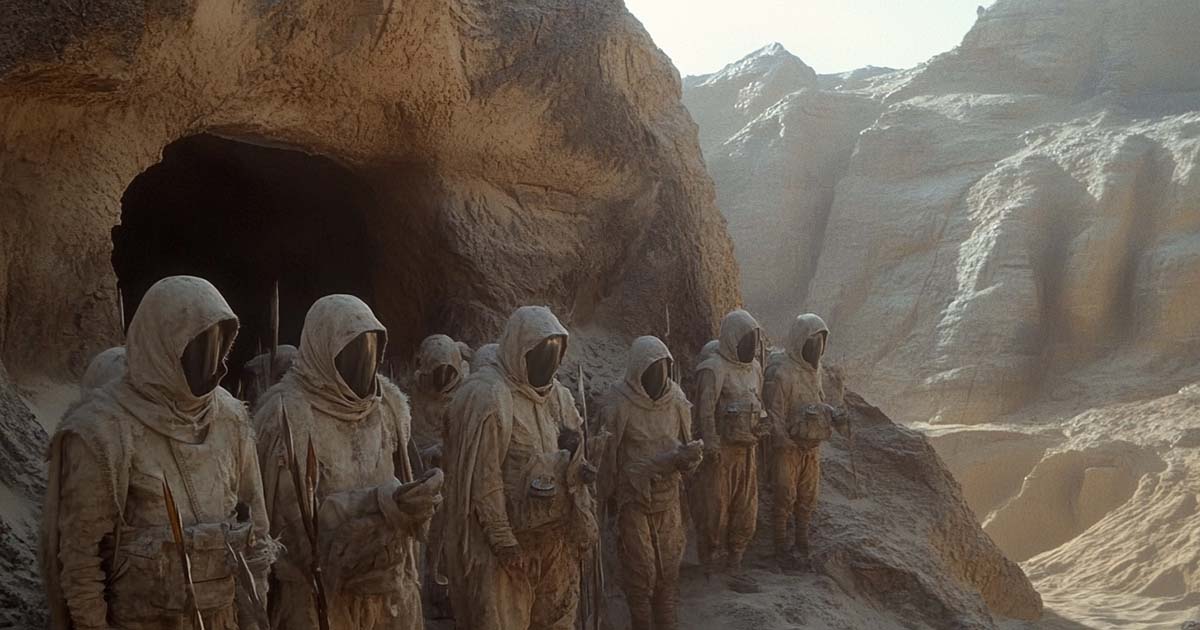The Mantle of Honor and Duty in "Dune"
"Dune" weaves honor and duty into a gripping tale of leadership, sacrifice, and destiny. Explore the Atreides' noble legacy, Fremen resilience, and Paul’s rise as a leader in a harsh universe.

In Frank Herbert's "Dune," honor and duty are the twin pillars defining the characters' actions and fates.
The novel, with its intricate interplay of political intrigue, survival, and destiny, presents these timeless values not as ideals, but as challenges every man must navigate in his journey to leadership and self-mastery.
For men striving to uphold traditional principles in a complex world, the lessons of "Dune" resonate deeply.
The Noble Burden of Atreides Honor
The House of Atreides is synonymous with integrity, compassion, and justice. These values, embodied in Duke Leto Atreides, set the tone for the family's noble but precarious position within the feudal interstellar empire.
Leto's sense of honor is not mere posturing; it is a practical commitment to the welfare of his people. On Arrakis, he works to build trust with the Fremen, the planet's indigenous population, offering them dignity and mutual respect in exchange for partnership.
Leto's honor, however, is a double-edged sword. It earns him loyalty, but it also places him at odds with the ruthlessness of the galactic political system.
The treachery of the Harkonnens and the Emperor illustrates the cost of living by a code of honor in a dishonorable world. Leto acknowledges this tension when he laments, "Here I am, entrusted with something I can't handle." His vulnerability, far from diminishing him, underscores the immense responsibility tied to honor.
For men today, Leto's story reminds us that leadership demands sacrifice, even in the face of insurmountable odds.
Fremen Honor – A Warrior's Code
The Fremen, the desert-dwelling people of Arrakis, offer a stark contrast to the noble but ultimately vulnerable Atreides.
Their honor is rooted not in abstract ideals, but in the brutal realities of survival. On Arrakis, where water is life, every action carries weight, and every decision is measured against the harsh demands of the desert.
Their warrior's code is clear —loyalty to the sietch, respect for resources, and a willingness to fight for their freedom.
This pragmatic approach to honor is exemplified in the Fremen rites and traditions. Leadership among the Fremen is earned, not inherited, as shown by Paul Atreides' need to prove himself through combat and cultural assimilation.

The Fremen honor strength, but not brute force. Fremen patriarchy values leaders who can balance courage with wisdom.
Paul's rise among the Fremen is a testament to the adaptability of honor. By respecting Fremen customs and embodying Fremen ideals, he earns their loyalty and lays the foundation for his eventual leadership.
For modern men, the Fremen's ethos underscores the importance of resilience, adaptability, and respect for the values of those you seek to lead. In this context, Honor is less about rigid codes and more about proving one's worth through action.
Paul Atreides & The Convergence of Honor and Destiny
Paul Atreides stands at the intersection of two worlds —the noble ideals of House Atreides and the practical, survival-oriented honor of the Fremen.

This dual heritage makes him uniquely positioned to navigate the moral complexities of leadership and power. His journey, however, is far from a straightforward ascent. The weight of his destiny constantly tests Paul's honor, which demands choices that blur the lines between morality and necessity.
From the moment Paul assumes the mantle of Muad'Dib, his actions reflect the struggle between personal integrity and the demands of prophecy. His decisions —whether to embrace the Fremen jihad or to manipulate religious fervor for political gain— force him to redefine what honor means in the context of his larger mission. Paul's admission, "To accept a mission is to accept its end," encapsulates the burden of duty. He understands that fulfilling his destiny comes at a cost, both to himself and to those he leads.
Paul's story offers a sobering lesson. Honor and duty are not static ideals but evolving challenges applied to each situation according to God's will. Honor and duty require men to make difficult choices, often with no correct answer. His journey invites the men among the novel's readers to reflect on their own lives, asking what they are willing to sacrifice in pursuit of their higher calling.
Honor and Duty as Timeless Virtues
What makes "Dune" enduring is its ability to present honor and duty as both aspirational and deeply human. Through the Atreides, Herbert shows that honor often comes with a heavy cost that, nonetheless, must be paid.
The Fremen reveal the practicality of honor in a world that demands resilience and resourcefulness. Paul's journey ties these threads together, illustrating that true honor lies in navigating the tension between personal values and external pressures.
For men today, the lessons of "Dune" are as relevant as ever. In an effeminate world where expediency compromises integrity, Herbert's characters challenge us to consider the long-term consequences of our actions. Leadership, whether in a family, a community, or a career, requires a commitment to principles that may not always lead to immediate rewards but pave the way for lasting impact.
Lessons
In the unforgiving sands of Arrakis, "Dune" teaches us that honor is not about perfection —it's about perseverance. Duty is not a burden to be avoided but a challenge to be embraced. Together, these virtues form the foundation of a life well-lived, offering a roadmap for men seeking to lead with purpose in a world that often rewards shortcuts.
Frank Herbert's epic is more than a science fiction masterpiece. It's a timeless meditation on the values that define us, inviting every man to ask, "What will you sacrifice for your honor? What duty will you fulfill to shape your legacy?"

